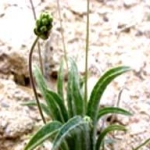| Common Name: |
Psyllium |
| Other Names: |
Blond Plantago, Blood Psyllium, Fleaseed, Flea Work Psyllion, Fleawort, Indian Plantago, Psyllium Seed, Spanish Psyllium, Spogel |
| Botanical Name: |
Plantago psyllium, Plantago ovata, Plantago afra |
| Genus: |
Plantago |
| Family: |
Plantaginaceae |
| Native Location: |
Mediterranean |
| Cultivation: |
Well-drained soil in sun (P. asiatica, P. psyllium); moist soil in sun or partial shade (P. major) Plantago major is prone to powdery mildew in dry conditions. |
| Propagation: |
By seed sown in autumn or spring. Plantago major and variants self-seed freely and spread from borders into lawns and paths. Variants come reasonably true from seed. |
| Harvest: |
Plants are cut during the growing season and used fresh, as juice, or dried for decoctions (P. asiatica). Leaves are cut before flowering and dried for infusions, liquid extracts, and tinctures (P. major). Ripe seeds are dried for decoctions and powders. |
| Height: |
60cm (24in) |
| Width: |
30cm (12in) |
| Hardiness: |
Hardy |
| Parts Used: |
Seeds, Seed Husks |
| Properties: |
A sweet, astringent, cooling herb that moistens membranes, soothes irritation, and absorbs digestive toxins. |
| Medicinal Uses: |
Internally for constipation, diarrhea, acid indigestion, gastric and duodenal ulcers, bowel problems, hemorrhoids, and urethritis. Used in Ayurvedic medicine with buttermilk for diarrhea and with warm milk for constipation. Externally for skin irritation, boils, abscesses, whitlows, and inflamed eyelids. Combined with Calendula officinalis (See, Pot Marigold) as a poultice for drawing out toxins..
Psyllium is used to treat constipation, hemorrhoids, dysentery, gout, pain, rheumatism, and inflammation of the gastrointestinal tract. Germany's Commission E has approved the use of psyllium to treat diarrhea, constipation, hemorrhoids, and elevated cholesterol, and psyllium seed to diarrhea and constipation. |
| Typical Dose: |
A typical dose of psyllium may range from 2.0 to 6.0 gm of psyllium powder. A typical daily dose of psyllium seed may range from 12 to 40 gm in divided amounts, always taken with plenty of water. |
| Possible Side Effects: |
Psyllium's side effects include flatulence, gastrointestinal distension, and allergic reactions. Psyllium seed's side effects include allergic reactions. It either psyllium or psyllium seed is taken improperly, it may trigger blockages of the esophagus or intestines. |
| Drug Interactions: |
| Taking psyllium with these drugs may increase the risk of hypoglycemia (low blood sugar): |
| Acarbose, (Prandase, Precose) |
Acetohexamide, (Acetohexamide) |
Chlorpropamide, (Diabinese, Novo-Propamide) |
Gliclazide, (Diamicron, Novo-Gliclazide) |
| Glimepiride, (Amaryl) |
Glipizide, (Glucotrol) |
Glipizide and Metformin, (Metaglip) |
Gliquidone, (Beglynor, Glurenorm) |
| Glyburide, (DiaBeta, Micronase) |
Glyburide and Metformin, (Glucovance) |
Insulin, (Humulin, Novolin R) |
Metformin, (Glucophage, Riomet) |
| Miglitol, (Glyset) |
Nateglinide, (Starlix) |
Pioglitazone, (Actos) |
Repaglinide, (Gluconorm, Prandin) |
| Rosiglitazone, (Avandia) |
Rosiglitazone and Metformin, (Avandamet) |
Tolazamide, (Tolinase) |
Tolbutamide, (Apo-Tolbutamide, Tol-Tab) |
| Taking psyllium or psyllium seed with these drugs may interfere with the absorption of the drug: |
| All drugs taken orally |
Carbamazepine, (Carbatrol, Tegretol) |
Digitalis, (Digitek, Lanoxin) |
Warfarin, (Coumadin, Jantoven) |
| Taking psyllium or psyllium seed with this drug may be harmful: |
| Lithium, (Eskalith, Carbolith)—may decrease drug levels in spite of escalations in dosage. |
|
| Lab Test Alterations: |
- Psyllium and Psyllium seed may reduce "aftereating" (post prandial) blood glucose levels.
- Psyllium and Psyllium seed may reduce total cholesterol levels, LDL "Bad" cholesterol levels, and LDL:HDL ratio.
|
| Disease Effects: |
- Psyllium and psyllium seed may reduce blood sugar levels too low in people with type 2 diabetes.
- Psyllium and psyllium seed may worsen cases of fecal impaction, spastic bowel, or gastrointestinal tract narrowing or obstruction.
- Psyllium and psyllium seed may increase the risk of esophageal blockage in people with swallowing disorders.
|
| Supplement Interactions: |
- May decrease absorption of Iron when taken concurrently with iron supplements.
- May reduce the absorption of calcium, iron, zinc and Vitamin B12 from supplements if psyllium seed is taken within a few hours of taking the supplements.
|
| Culinary Uses: |
Seeds are sprouted for salads. |
| Economic Uses: |
Seeds or husks are an ingredient of face masks. Mucilage from seeds is used as a fabric dressing, and as a thickener and stabilizer in dairy-based desserts. |
| Bibliography: |
The Encyclopedia of Herbs by Deni Bown, Copyright © 1995, 2001 Dorling Kindersley Limited. pp. 322-323
The Essential Herb-Drug-Vitamin Interaction Guide by Geo. T. Grossberg,MD and Barry Fox,PhD Copyright©2007 Barry Fox,PhD. Pp.381-382 |

